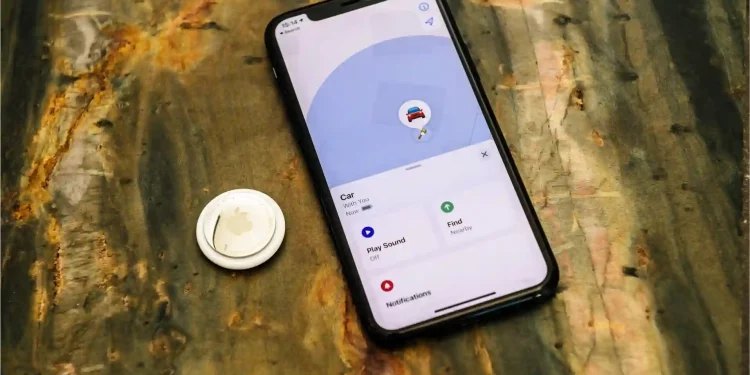While the internet can be a beneficial tool in the contemporary era, it can control our lives without our slightest knowledge. For example, a mother decides to install a chip within her offspring’s head to retrieve data of where she is, what she views, who she converses with, and even to block explicit content without the offspring avoiding it. The program that permits it is dubbed Arkangel. Developed on a tablet, Arkangel is not a reality yet. However, it is merely a fictional philosophy from which Jodie Foster created an episode of the fourth season of the Netflix series – Black Mirror.
For the moment, to alleviate the raging fears of parents, there are other substitutes in reality—for instance, GPS tracking apps, Bluetooth locators, and smartwatches for kids.
According to the figures of the 24th study Navigators on the Net drafted by the Association of Media Research (AIMC), almost 14% of the internet’s consumers use products like – Apple’s AirTag or Samsung’s Galaxy SmartTag. Of that 14%, over half (7.5%) stated that they utilise it to locate other people, like their children, and thus know their location at all times.
The AIMC study surveyed 15,000 internet utilisers over 14 years old at the dusk of 2021. Owing to the results offered by the survey, specific behavioural patterns can be witnessed in internet users.
Bluetooth locators can benefit those who lose valuable items like wallets or keys. In addition, it can also keep track of consumers’ suitcases when travelling or their car when parked at a spot they cannot recollect. Bluetooth locators can also locate missing children.
Ever since the firm led by Tim Cook commenced marketing this device in April 2021, the utilisation of this and other models has become vastly common. However, in nations like the USA, the possibility of locating others with them has resulted in cases of monitoring and harassment.
This is considerably true for women, for instance, when a victim is unaware of their backpacks being tracked by such devices. In February 2021, Apple reassured that these cases were rare via a statement. However, the firm was forced to declare an array of measures to enhance security and deliver tools and tips to consumers.
Locators are not the only gadgets that have emerged popular over the past year. Smart speakers like Siri or Alexa matured to 15% committed users in 2021. Alexa, Amazon’s voice assistant, is the most renowned and maintains a presence ahead of Apple and Google. In 2021, 14.5% of the users utilised it numerous times a day, specifically to request music or radio stations.
Even queries of the weather, traffic and the internet were not uncommon. One can also recollect fictional examples of such instances as a man’s platonic relationship with AI, as in Spike Jonze’s movie ‘Her.’
The endless connection time declines vary little
In 2021, 47.5% of internet users confessed to utilising the internet almost at all times, as Pablo Alonso (General Technical Director of the Association of Media Research) explained. Merely 0.3% less than 2020. Alonso stated that, although in 2021, we did not witness rigorous lockdowns as in the first year of the pandemic, the Omicron variant had commenced spreading during the survey’s tenure.
As a result, several people spent less time on the street hoping for a merry Christmas. This could explain the minimal variations in consumer behaviour in 2021 compared to 2020.
The average daily time consumers spent online in 2021 was close to 4 hours and 8 minutes, 4 minutes less than 2020. However, the numbers were 15 more than before the coronavirus pandemic. Approximately 20% came to be online 8 hours per day.
The smartphone endures as a stellar gadget
As per data obtained, the smartphone lasts to lead the race amongst various electronic and intelligent gadgets that consumers use to access the internet. According to the AIMC study, 92.5% of internet users constantly utilise smartphones. 72% make daily utilisation of the laptop and 47.5% of the tablet. However, merely 13.8% utilise smartwatches. However, the number of people using smartwatches has expanded by 2% since 2020.
Concerning the internet connection, 50% of the internet consumers surveyed by the AIMC appealed to have had unlimited mobile data in 2021. Over 30% accessed 5G networks. The rate of utilisation of QR codes also maintains constant acceleration.
Smart lighting rules the internet of things
The utilisation of home automation, gadgets with an internet connection mounted in homes, strives to expand. In 2021, over 40% of internet utilisers had at least one smart device at home, compared to the 29% in 2019. Lighting gadgets like smart bulbs constantly lead the rest of the devices ahead of those that permit surveillance.
Instagram retains audience when compared to Facebook
For four consecutive years, Facebook has lost several users. It has dealt with a 15-point drop since 2018. Merely 70% of the internet consumers scrutinised constantly use their Facebook accounts. Instagram, also possessed by Meta, accumulated its growth and progression in 2021 with 64.6% user penetration, 2.5 points higher than in 2020. TikTok is constantly growing but is left behind by Instagram, with 21.5% of consumers amongst the AIMC scrutinised.
Covid-centric applications
65% of the consumers state that they have demanded the digital immunisation certificate and around 50% still have an application connected to covid installed on their smartphones. In 2020, a little over 20% of the consumers still possess Radar COVID, the official app for people who have contacted covid positive individuals. Although, the AIMC research witnessed this number fall by 15% in 2021.
Broad Acceptance of Infuriating Cookies
Over half of the internet users find cookies irritating. Around 46% of these users consider it is unnecessary. However, according to the AIMC study, nearly 70% usually accept them, with a broader or tinier configuration level. Almost 50% believe that they take too much time. Around 21% acknowledge that data from cookies are utilised appropriately.
















